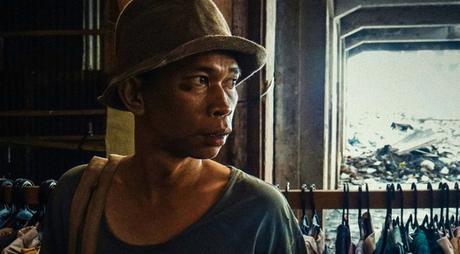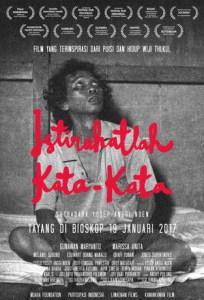
Review: In 1996, political situation in Indonesia heated up. A turmoil involving Partai Rakyat Demokratik (PRD) - Democratic People Party - opposed authoritarian Soeharto's regime. In aftermath of it, activists and supporters of the movement were hunted down to be silenced and wiped off from the history (possibly be killed in the process).
Wiji Thukul, a vocal anti-govt poet and an activist, was accused as the responsible one for mobilizing the masses prior to the turmoil. As a fugitive (of a war between people and govt), Wiji fled to Pontianak, Borneo - almost a thousand kilometers away from his family and hometown in Solo, Java - by himself. A weary poet is on the run by himself; in exile, he coalesces with solitude in Yosep Anggi Noen's Solo, Solitude (a.k.a. Istirahatlah Kata-Kata).
Director and writer, Yosep Anggi Noen, doesn't intend to fashion you a new Che Guevara as an icon of revolution. There's no single shot of violence or visual oppression; there's no flashback to Wiji's endeavor and deeds that made him antagonized by the govt; and there's no over-glorifying the subject as a people's saint. What's left are grim pictures and silence blending in poetry. Poignant poems, narrated in trembling, hoarse and lisp voice-over of a poet, accompany the pariah staggered as the vicious regime buried him in constriction.
"Turns out, being a fugitive is more harrowing than facing a band of green-bean soldiers in a march," Wiji confessed to his friends before a cross-stitched picture of The Last Supper. Fears perched on his guts; limiting his movement and his freedom, but he kept on writing although he found it more difficult. At a point, the govt seemingly won in burying 'the people's voice.' At the same time, this circumstance resembles Greek poet, Dinos Christianopoulos' two-line poem, saying "What didn't you do to bury me? But you forgot that I was a seed." Strange but true, Wiji Thukul's name, rooting from Javanese language, means 'a seed grows' and that's how Solo, Solitude depicts him: having him buried only to slowly grows. For that, Wiji thanked the govt who oppressed him for letting the flowers from his seeds bloom, waging war against the tyrany.
The voyage is depicted like Wiji's poems narrated within the films. The diction isn't fancy, but is carefully picked and crafted into sharp, bleak, truth-opening beauty. At same frequency, the motion picture resembles the poems; the objects of the shot aren't fancy, sometimes, they're cringe-worthy, but Yosep Anggi Noen crafts them into a symbolism-laden beauty. The symbolism blends perfectly with realistic, non-dramatic and almost banal elements the film carries. At one point, Wiji is given a bicycle and he rides towards an intersection... turning left.
While Wiji Thukul is the epicenter of Solo, Solitude; Yosep Anggi Noen also places the spotlight to an important figure of the poet's life: his wife, Sipon. A devoted wife has been forced to turn into a strong backbone for her two children while her husband hides from the power that hunted them. Govt's intelligence occasionally visited her and harassed her family; neighbors turned their back against her; and a relative abused her; yet, Sipon - fueled by her longing to her husband and normal life - survived. Shots of Sipon's back dominate most of her screen time; it might look like shots of a normal woman's spine; but there's strength there, obviously reflected without having to be told.
Gunawan Maryanto lends his charms perfectly into making the poet's persona and Marissa Anita becomes a perfect companion as the wife. "I don't want you to leave; but I don't want you to return; I just want you to be," Sipon protested in the end. She then wept in a deep grief as she swept the floor - sweeping the last remnants of her husband's memory as the poet continued his cause and disappeared.
It's a poetry of a growing seed - Wiji Thukul (from Javanese words, 'wiji'=seed, and 'thukul'=grow). Give yourself up and let Solo, Solitude rest your words. Let them buried with the seeds of resistance. Let them bloom with poems of soul.
Solo, Solitude (2017)
Istirahatlah Kata-kata

Drama, Biography Written & Directed by: Yosep Anggi Noen Starred by: Gunawan Maryanto, Marissa Anita, Melanie Subono Runtime: 97 min Rated R
